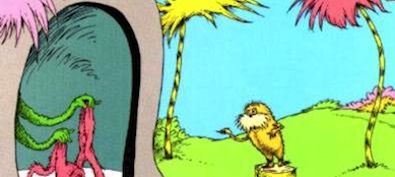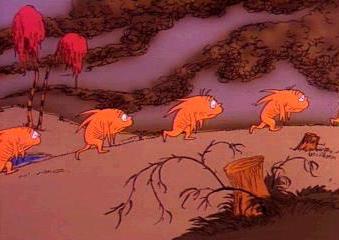
Ecofiscal so simple a 7-year-old can understand it
What The Lorax can teach us about pricing pollution
Admission: I am not an economist. However, I have been given the tremendous opportunity to work with a dozen of Canada’s leading economic-policy experts to help launch and communicate the work of Canada’s Ecofiscal Commission. Having spent the past months immersing myself in the research and thinking behind the Commission’s first report, I was taken off-guard a bit this morning when my seven-year-old son asked me “Mommy, what is it exactly that you do?”
After struggling a few moments, recognizing that I didn’t have a simple answer to explain economics as a concept (we’ll check out #economicsinthreewords a little later tonight!), I grasped back to a favourite touchstone story in our family: The Lorax.
More than just a tale about the environment
Hailed as a before-its-time environmental tale, The Lorax – I realized – is also an economic story. It touches not only on the basic principles of supply-and-demand and innovation (after all, the thneed is a something that everyone needs). It also addresses fairly modern concepts of natural capital and sustainable development. So, to explain to my son what mommy has spent all day, every day, working on over the past few months—we reread The Lorax again, through an “ecofiscal” lens.
The first thing to get straight is that the Once-ler (the perpetrator of pollution in the story) is not actually a bad guy. His intentions are good—to make something useful. Something that people will benefit from and value. The market rewards him for this and his “thneeds” (a kind of widget) start selling like hotcakes. The problem is, as the Once-ler increases thneed-production to keep up with demand, he starts taking some shortcuts. And these shortcuts result in some pretty yucky outcomes: loss of biodiversity, smog, and water pollution.
Simplifying the economics of The Lorax
You see, the production of thneeds produces a lot of “gluppity-glup” and “schloppity-schlopp.” Toxic stuff that the Once-ler dumps into the pond behind his factory, hurting the Humming-Fish that once swam happily there. Now, of course, we don’t know if the Once-ler’s community has a fishing industry, but if it did, we can imagine that the exodus of Humming-Fish would hurt that too. As it would anyone who lived nearby and depended on that pond for drinking water. But these costs aren’t factored in to the cost of producing thneeds. They are externalities (I didn’t quite go there with my 7-year-old, but you get the point).
But I did ask my son: what do you think would happen if the Once-ler had to pay for every bucket of “gluppity-glup” he dumped into the pond? Well maybe the cost of thneeds would go up, and sales maybe would go down (who wants a really expensive thneed?). But, by his very nature, the Once-ler is an innovator. He invented the thneed. He wants to keep selling them. So, do you think he could come up with another invention? An invention that would make thneeds with less or no “gluppity-glup”? Or one that would somehow make “schloppity-shlop” less harmful to the Humming fish and the water? If he put his mind to it, if really had a reason to try, yeah—my son thought—I bet he could.
The sad lesson of the The Lorax is that the Once-ler doesn’t recognize the greater impact of his thneed production until it is too late. His factory closes its doors. His workers disperse.
But we can imagine a different ending to the story. An ending where the right pricing policies inspire the Once-ler’s natural proclivity for innovation. Where a “cleaner greener thneed,” also drives technological advances in manufacturing and production. We can imagine an ending where a child isn’t left with the responsibility of rebuilding the Once-ler’s once-beautiful world with only a single Truffula seed.
The basic principle behind ecofiscal policies is pretty simple and intuitive. The real effort isn’t about understanding why we should be exploring these options for Canada, but rather how we can make those policies work in the best possible way for Canadians. I’m pretty proud to be working with this Commission set on taking on that task. And hopefully, now that he understands it a little better, my son will feel proud too.





Comments are closed.